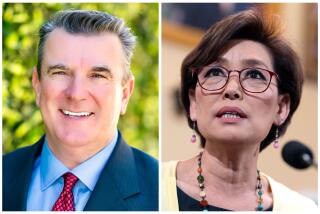Racial Conflict Brutalizes L.A. Politics
Race is the hardest story to cover in Los Angeles.
Sometimes I feel like a foreign correspondent in my own town, a far-from-home white male, walking familiar streets trying to understand the unfamiliar cultures of Asia, Mexico, Central America or black America. Occasionally, I’m confronted by racism directed at my own race.
Racism. We never get away from it. I remember sending a young African-American reporter to cover a big-money political fund-raiser. When she got back, she told me how some guests asked her to fetch them drinks. I recall a Korean-American reporter--a dedicated liberal--coming back from a black demonstration against a Korean-American store owner, shocked at the prejudice displayed against him.
Everything we cover, from the selection of a school superintendent to the location of a big high school football game, is dominated by racial conflict. When a politician urges unity, as state Sen. Art Torres did at the First African Methodist Episcopal Church on Sunday, the event is so unusual that it becomes news.
Oddly enough, a positive experience has triggered these negative thoughts. I got away from urban L.A. for a couple of days to the San Gabriel and Pomona valleys, where I have been occasionally sampling political trends. I talked to Mayor Jay Kim of Diamond Bar and heard about his effort to become the nation’s first Korean-American member of Congress.
Kim is a thin, disciplined engineer who came to this country in 1961, when he was 22. He worked his way through Chaffey College and USC as a janitor, a dishwasher and in a newspaper circulation office. His wife, also a Korean immigrant, was a nursing aide, cashier and office manager. Kim started an engineering firm and became successful.
Kim is the Republican nominee for Congress in the 41st District, which includes parts of eastern Los Angeles, western San Bernardino and northern Orange counties.
Many residents are young suburbanites who moved there so their children could attend good public schools. The district is racially mixed. Kim’s finance chairman is Les Johnson, an African-American who is president of the Chino Unified School District. Only 10% of the congressional district’s population is Asian.
Republican Rep. Dave Dreier of Covina, who was recruiting GOP congressional candidates, persuaded Kim to run. But few, besides Dreier, thought Kim could win. This was especially true of the man Kim wanted to run his campaign, Bob Gouty, one of the Republicans’ most accomplished direct mail specialists.
Gouty told Kim he couldn’t win. His English wasn’t good enough. Kim said he’d work on it. Gouty said it would cost him a lot of money. Kim said he had it to spend. “When I talked to him, I thought that’s the kind of man I want,” Kim said. “Not soft, but hard hitting. I’ve got to have a no-nonsense man. I need someone with a lot of guts. I fell in love with him right away the first day.”
Gouty took the job and pondered the great unknown of the Republican primary, how GOP voters would react to a Korean-American candidate. His first mailing met the issue squarely. Kim’s picture was on the front page. Inside were pictures of Kim, his wife, June, and their three children, including Richard, a neurosurgeon, and his fiancee, Dr. Anita Gregory, a plastic surgeon.
“What’s significant is they went straight up front with the Korean identity,” said Alan Heslop, who heads the Claremont Colleges’ political think tank, the Rose Institute.
In the primary, Kim defeated former Assemblyman Chuck Bader and other opponents. In November, he is favored to beat Democrat Bob Baker of Anaheim, a defense policy analyst for Northrop. The district has a Republican majority and Kim is outspending Baker by a large amount.
I couldn’t help imagining what it would be like if this campaign were held in L.A.
Secret summit meetings of ethnic leaders would have pondered the Kim candidacy. Other ethnic candidates would have jumped in. We reporters would have been dispatched to news conferences where candidates would hurl veiled racial insults at each other--and at us--no matter what our ethnic backgrounds.
This brutal style of politics reflects the intractable poverty that afflicts too many neighborhoods. Trapped by poverty and without much hope, the races engage in combat they see as their only way out.
Out in the eastern San Gabriel and Pomona valleys, in San Bernardino County’s Inland Empire, in the hills of northern Orange County, hope remains despite the punishing recession.
Race is an important issue. But away from urban L.A., it’s not the whole story.
More to Read
Sign up for Essential California
The most important California stories and recommendations in your inbox every morning.
You may occasionally receive promotional content from the Los Angeles Times.









